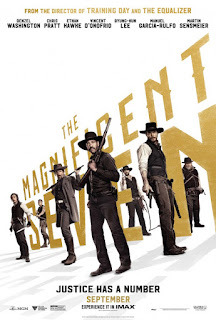The Magnificent Seven (2016)
Well, I like it.
This review is also up at Channel 24
This review is also up at Channel 24
What it's about
A
remake of the classic western (which itself was a remake of the even
more classic Seven Samurai), seven gunslingers are called to protect
a town from a vicious crime boss who is trying to bully them out of
their homes.
What we thought
Remaking
classic films always strikes me as a rather stupid idea because, no
matter how good the remake, it always struggles to escape the shadow
of its predecessor. This, incidentally, is why it always makes much
more sense to remake mediocre or highly flawed movies, as that way
you can rely on an existing property but you might actually have a
chance of transcending your source. See horror classics like the Fly
or the Thing to view first hand just how well this works when done
properly.
When
it comes to remaking the Magnificent Seven, though, things are rather
more complicated. Not only was the original itself a remake (though
this is actually one of the rare cases when it can actually be called
a “reimagining”) but it was one that, though still a quality
piece of work, is very much a product of its time and does, dare I
say it, look quite dated to modern eyes.
This
perhaps might explain why the new Magnificent Seven, though seriously
flawed in one or two aspects, is actually a very successful remake
and a really solid film in its own right.
Its
flaws mostly have to do with the usual modern-blockbuster problem of
the final act being essentially a very, very long action scene that
can't help but become somewhat monotonous as it goes along. In this
case, it's not as well handled as the first Avengers film but is
much, much better than something like any one of those interminable
Transformers movies. More unforgivable, though, is that it only it
only uses Elmer Bernstein's unforgettable theme right at the end of
the film. I mean, the late James Horner's (sadly final) score is
pretty terrific in its own right but the wait for those classic notes
to start playing was cruel torture.
What's
really interesting, though, isn't why the film fails when it does but
how and why it succeeds. Part of it, unquestionably, has to do with
just how timeless and archetypal the basic Seven Samurai story is so,
to be fair, Antoine Fuqua and screenwriters Richard Wenk and Nic
Pizzolatto would have had to work pretty hard to screw it up.
What
sets this version of the Magnificent Seven apart, though, is its mix
of a really old-fashioned aesthetic with the more modern idea of
“diversity”. It's a trick that worked for the new Ghostbusters
and it's a trick that arguably works even better here.
To
lay all my cards on the table, though I admire what the current
diversity movement is trying to do, I often find that it adds up to
little more than heavy handed tokenism that's more about appeasing
so-called “social justice warriors” than truly trying to reflect
the world around them. The Magnificent Seven, however, uses its
multicultural cast not just to make a statement but as something that
adds several new layers to the story that simply wasn't there in the
all straight, white, alpha-male cast of the original – though,
admittedly, no one is quite as peculiar a screen presence as Yul
Brynner.
The
fact that the Magnificent Seven is comprised of a black man, an Asian
and, most pertinently, a Native American adds a whole new dimension
to it when you consider its setting. The film already does plenty to
diversify the utterly wonderful cast in terms of their personalities
and backgrounds (I don't really need to spell out just how great
people like Ethan Hawke, Chris Pratt, Vincent D'Noffrio and the
always brilliant Denzel Washington but the lesser known actors are
just as good) and even adds a prominent female role into the mix
(Haley Bennet, very good as a sort of mix between Jennifer Lawrence
and Brit Marling) but their racial and ethnic differences really does
give it an extra push.
Interestingly,
though, for all that this does add a more modern flavour to the film
and the general quippiness of the dialogue clearly owes at least
something to Marvel's superhero movies (indeed, the Magnificent Seven
is hardly a million miles away from a superhero movie in the first
place) but there's also something refreshingly old fashioned about
it.
The
western has had a real renaissance in recent years but whether it's
the Coen Brothers Coens-ing the hell out of True Grit or the upcoming
and utterly brilliant Hell or High Water deconstructing everything we
take for granted about the Western, it also hasn't really been
allowed to kick back and just revel in its own generic trappings. The
Magnificent Seven, though perhaps more stylish than many a classic
Western thanks to Fuqua's more distinctive directorial voice, clearly
has tremendous fun playing with all those old Western trappings and
ends up feeling like it could have come from any time in the past
thirty years (albeit not from the last sixty).
Ultimately,
for all that it's gotten a serious kicking from many a critic, the
Magnificent Seven is easily one of the most satisfying blockbusters
of the year. It's way fresher than it has any right to be and
features a cast that easily rivals and often surpasses the originals
but it's worth seeing first and foremost simply because it is a
tremendously good time at the cinema. And considering just how boring
and dour many of this year biggest films have been (hello Suicide
Squad and BvS!) that's no small thing.


Comments
Post a Comment